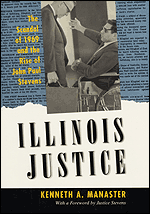Yes, there is justice in Illinois
 Perhaps the only person mentioned as frequently as Rod Blagojevich in the deluge of news about our governor’s alleged political crime spree is Patrick Fitzgerald, the U.S. attorney prosecuting the case. Most recently in the news for prosecuting Dick Cheney’s former aide I. Lewis “Scooter” Libby, Fitzgerald’s investigation of Blagojevich has made him the subject of several recent profiles, which refer to him in such terms as a “folk hero in a state beleaguered by official crime” and “totally and completely dedicated.” Some of the stories even speculate that Fitzgerald could become the chief of the Justice Department’s Criminal Division, the deputy attorney general, or the next FBI director after Robert Mueller’s term ends.
Perhaps the only person mentioned as frequently as Rod Blagojevich in the deluge of news about our governor’s alleged political crime spree is Patrick Fitzgerald, the U.S. attorney prosecuting the case. Most recently in the news for prosecuting Dick Cheney’s former aide I. Lewis “Scooter” Libby, Fitzgerald’s investigation of Blagojevich has made him the subject of several recent profiles, which refer to him in such terms as a “folk hero in a state beleaguered by official crime” and “totally and completely dedicated.” Some of the stories even speculate that Fitzgerald could become the chief of the Justice Department’s Criminal Division, the deputy attorney general, or the next FBI director after Robert Mueller’s term ends.
All this reminded us that in addition to (and probably because of) its now-worldwide reputation for political corruption, our state also has a long history of launching the prominent careers of corruption fighters. Illinois Justice: The Scandal of 1969 and the Rise of John Paul Stevens tells the story of one such rise to fame.
Expertly narrating this dramatic tale, Kenneth Manaster begins in 1969, when citizen gadfly Sherman Skolnick accused the chief justice and another Illinois Supreme Court justice of accepting valuable bank stock from an influential Chicago lawyer in exchange for deciding an important case in the lawyer’s favor. The feverish media coverage that resulted—a scandalous story in its own right, as Manaster reveals—prompted the state supreme court to appoint a special commission to investigate. Within six weeks and on a shoestring budget, the commission gathered a small volunteer staff and revealed the true facts. Stevens, then a relatively unknown Chicago lawyer, served as chief counsel. His work on this investigation would launch him into the public spotlight and, eventually, onto the Supreme Court.
So how will Fitzgerald’s story proceed? The New York Times notes that “partly because of the long history of corruption cases in Chicago, United States attorneys there have often been more prominent than in most cities. Some have used the post as a step to the governor’s mansion or other political perches. But friends say that Mr. Fitzgerald … is a natural for pursuing criminals.”